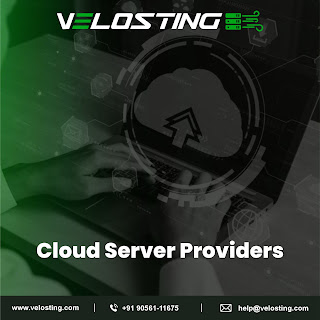Choosing Suitable Cloud Server Providers for Your Business
Modern IT infrastructure now relies heavily on cloud technologies as companies continue to embrace digital transformation. Cloud servers' scalability, affordability, and dependability have led to their growing popularity. Whether you are managing a data-intensive application, an e-commerce site, or a developing company with varying resource requirements, cloud server providers can provide a flexible solution to suit your requirements. This article will discuss the advantages of adopting cloud hosting solutions, the various services that cloud server hosting companies offer, and factors to take into account when selecting the best provider for your company.
Who are cloud server providers?
Virtual servers, as opposed to conventional physical servers, are hosted on the cloud infrastructure by cloud server providers. To establish a scalable, adaptable, and safe hosting environment, these companies employ virtualization technologies in high-performance data centers. Because the cloud server is separate from other tenants, its resources (such as CPU, RAM, and storage) are all allocated to your particular requirements.
Factors to Consider When Selecting Cloud Server Providers
Businesses must take into account a number of things when selecting a cloud server provider to make sure they get the best solution for their requirements:
1. SLA, or service level agreement
A strong SLA including uptime guarantees, response times, and support availability should be included with any cloud hosting package. An SLA guarantees that the supplier satisfies the dependability, uptime, and support requirements of your company. Verify that the supplier has a robust SLA and explicit standards on compensation for outages.
2. Cloud Management Services
Instead of managing their cloud infrastructure, several companies would rather concentrate on their core competencies. Choosing managed cloud services can be a wise choice in these situations. The technical facets of the cloud environment, such as upgrades, monitoring, security, and troubleshooting, are handled by providers that offer cloud server management. Your IT staff may concentrate on strategic tasks by using managed services to free them up.
3. Cloud Server Security
Security ought to be a primary concern in light of the increased cyberthreats. Make sure the cloud server company you select has robust security measures in place, including intrusion detection systems, SSL certificates, data encryption, and cloud server security features. In order to keep your data safe from changing threats, several providers also provide managed cloud services that include frequent security audits and updates.
4. Efficiency and Speed
The speed and responsiveness of the server have a direct impact on how well your company's website or application performs. Make sure the cloud-based server hosting company you select delivers low-latency, high-performance servers. SSD-based storage is used by many providers to improve speed and responsiveness, which is crucial for companies that need to analyze data in real time or handle high traffic volumes.
Cloud Server Hosting Solution Types
To accommodate various company requirements, cloud server providers usually give a variety of hosting options. These consist of:
1. Hosting on Public Clouds
Although the infrastructure in a public cloud environment is shared by several clients, the resources and data of each client are kept apart. This is the most economical option, and it works well for companies with low security or customisation requirements. Public cloud suppliers usually offer managed cloud services that include security, scalability, and basic support.
2. Hosting on Private Clouds
More control over your environment and dedicated infrastructure are two benefits of private cloud hosting. Businesses with certain security or performance needs can use it. Businesses that use private cloud hosting can set up their servers to precise specifications with cloud server management. Although these solutions are frequently more costly, they provide better control and privacy.
3. Hosting for Hybrid Clouds
A hybrid cloud strategy blends aspects of private and public clouds. It enables companies to use public cloud services for less sensitive tasks while keeping sensitive data on private servers. For businesses that require the flexibility of the public cloud while still having more control over vital data and apps, this kind of hosting might be especially useful.
Conclusion
The performance, scalability, and security of your company can all be greatly impacted by your choice of cloud server provider. Businesses may easily select a service that fits their unique needs thanks to the large variety of cloud hosting solutions accessible today, whether they are managed cloud services, cloud-based server hosting, or cloud data storage providers. You can make sure that your company is prepared for success in the cloud by taking into account elements like scalability, cost, security, and dependability. With the correct provider, you can concentrate on expanding your company while letting the professionals handle the technical aspects of managing your cloud server.
If you are looking for a suitable cloud server provider, Velosting serves as one of the best cloud servers providers pan India as it offers a variety of services including domain services and hosting services, with constant customer support all along ensuring smooth running experience for a user.



Select cloud server providers that lifetime hosting offer scalable resources, strong security features, and reliable uptime for seamless business operations. Ensure they provide excellent customer support and flexible pricing to suit your needs.
ReplyDeleteGreat breakdown of IT support pricing in Abu Dhabi! The explanation about monthly contracts vs. on-demand support really helps businesses understand cost structures better. Companies comparing options with IT Infrastructure Services Dubai will also find this pricing insight valuable for budgeting and long-term IT planning.
ReplyDelete